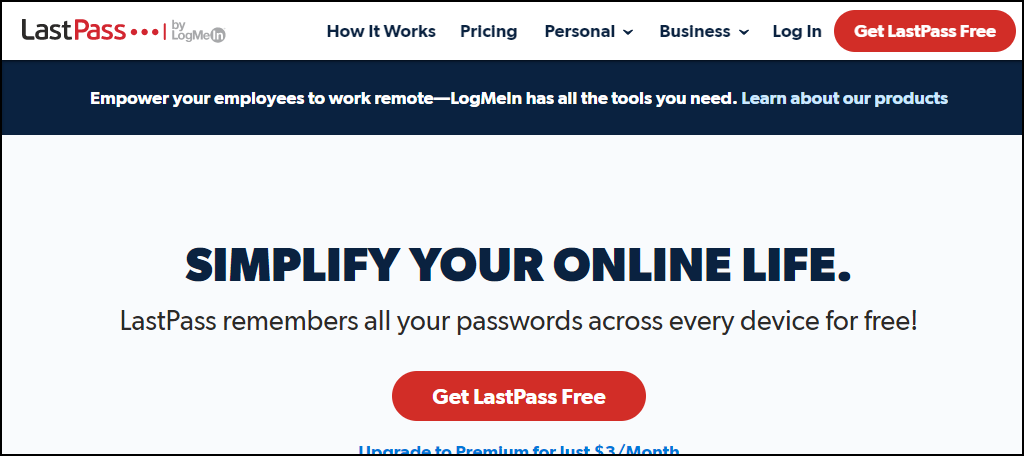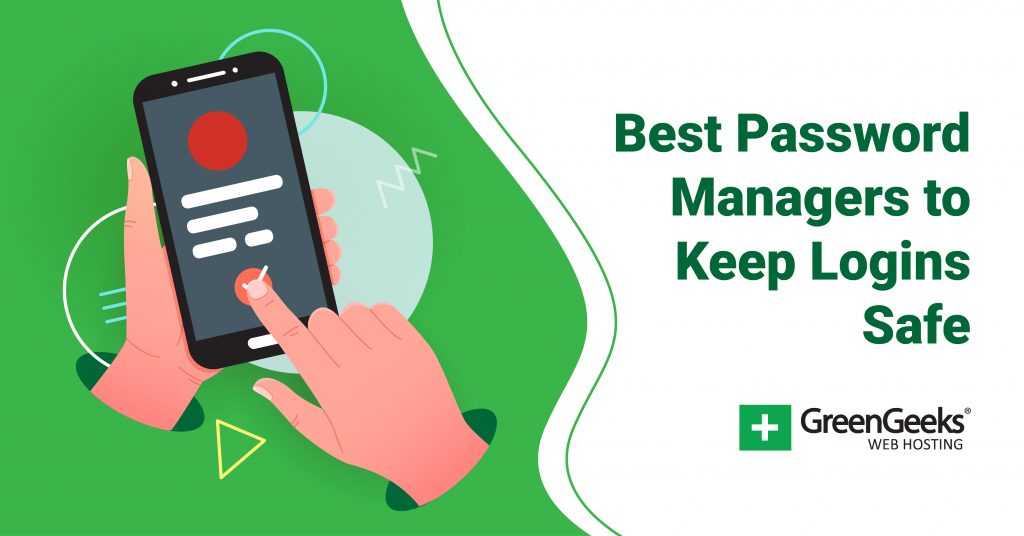Passwords. Our lives revolve around them. If you’re still writing passwords on Post-It notes, envelopes, and napkins, it’s time to consider using a password manager. Luckily there’s no shortage of password managers to choose from.
They all store your username/password combinations, but some boast features that make your online life easier and more secure. We’ll take a look at nine of the best password managers so you can make an informed decision.
The Problem With Passwords
Passwords are necessary for managing personal, financial, or other identifying information online. But as we manage more and more information on more and more websites, password management becomes problematic.
Especially when all of the password advice out there tells us not to use the same password on multiple sites.
Of course, there’s good reason to use a unique password for each site. If someone gets their hands on one of your passwords, they don’t gain access to all of your accounts. But using a unique password for every account you manage quickly becomes overwhelming.
The average email address in the U.S. is associated with 130 accounts. Very few of us could remember that many different passwords.
So what happens? We find ourselves re-using passwords, using insecure passwords, or creating variations thereof. None of those methods adequately protect us.
Perhaps you don’t want to rely on using Google Chrome to manage passwords.
So what’s the answer?
Password Managers to the Rescue
Using a password manager app can improve your password game dramatically. Most of the managers we’ll talk about today work as a browser plug-in. They can insert your usernames and passwords (automatically or manually), and also store new logins.
If you have multiple logins for one domain, all of your logins will be listed. Just click the appropriate one and you’re in. Most will also detect when you change your password and prompt you to update the saved credentials.
When your passwords are stored in an app, you can use unique or complex phrases without committing them to memory. Most password managers will even generate secure passwords for you.
If you’ve never used a password manager before, that can be a bit unsettling, not knowing your own passwords. It’s also a bit strange the first few times your password manager automatically logs you into a site.
But, you’ll quickly adapt and see the benefits.
Not all password managers are created equally. They work in similar ways but differ in features and price. Some are better for single users, others for families or organizations. This guide provides the key features and pricing for the best password managers available today.
Most of the password managers on this list will cost a bit of money. But many of them can be used for free, though without all the features of the paid versions. If you try a free version and like it, consider paying for the premium version.
It’s money well spent.
Okay, let’s get to it. Here are some quick links to the password managers covered in this article.
Note that all of the benefits listed may not be available in the free versions of the programs.
The Best Password Managers
1. Keeper

Keeper is focused on business users, but they offer a personal plan as well. Features instant synchronization with every mobile device and computer that you use. Keeper is among the top-rated password managers for good reason.
Key Benefits of Using Keeper
- Face and fingerprint recognition.
- Mobile version of the app.
- Generates passwords.
- Stores other personal data (addresses, credit card numbers, etc.).
- Manages non-website application passwords.
- Integrated secure browser.
- Can import login data from another password manager.
Keeper Pricing
- Free personal plan available.
- Personal plan starts at $2.91 per month.
- Four other tiers with multiple pricing options are available.
2. LastPass

I use LastPass, so I may be biased, but it definitely belongs in any list of the top password managers. Remember when I said that the average email address in the U.S. is associated with 130 accounts?
My LastPass vault has 441 entries. I’ve been using it for many years, and it’s never failed me.
Key Benefits of Using LastPass
- Face and fingerprint recognition.
- Mobile version of the app.
- Generates passwords.
- Flags weak passwords.
- Stores other personal data (addresses, credit card numbers, etc.).
- Manages non-website application passwords (LastApp).
- Can import login data from another password manager.
LastPass Pricing
- Free personal plan available.
- Premium single user $3 per month.
- Premium family $4 per month (6 licenses).
- Multiple business tiers are available with per-user pricing.
3. RoboForm

RoboForm automatically captures and saves passwords, and has a “security center” to help you evaluate your online security. It also stores notes (you’ll use this feature more often than you think) and contacts.
It’s also been around for a very long time, so you know they have a great track record.
Key Benefits of Using RoboForm
- Face and fingerprint recognition.
- Mobile version of the app.
- Generates passwords.
- Stores other personal data (addresses, credit card numbers, etc.).
- Manages non-website application passwords.
- Can import login data from another password manager.
RoboForm Pricing
- Free personal plan available.
- Personal $23.88 per year (1 license, no monthly plan available).
- Family $47.75 per year (5 licenses, no monthly plan available).
- Multiple business tiers are available with per-user pricing.
4. Dashlane

Dashlane features a friendly interface and a number of security extras some other managers don’t offer. It can be complicated for users new to password managers, and it’s a bit on the pricey side compared to alternatives.
Key Benefits of Using Dashlane
- Face and fingerprint recognition.
- Mobile version of the app.
- Generates passwords.
- Stores other personal data (addresses, credit card numbers, etc.).
- Manages non-website application passwords.
- Integrated VPN.
- Can import login data from another password manager.
Dashlane Pricing
- Free plan available (limited to 50 passwords).
- Premium $4.99 per month.
- Premium Plus $9.99 per month.
- Family Premium $7.49 per month (6 licenses).
- Multiple business tiers are available with per-user pricing.
5. Zoho Vault

Zoho Vault is another password saver with a lot of features aimed at business users. But it does the job as a personal password locker as well.
One feature that stands out is a password change reminder. You can set reminders to change your passwords at whatever interval you’d like. Most of us don’t change passwords often enough (if we change them at all), so it’s a valuable security feature.
Key Benefits of Using Zoho Vault
- Fingerprint recognition.
- Mobile version of the app.
- Generates passwords.
- Stores other personal data (addresses, credit card numbers, etc.).
- Manages non-website application passwords.
- Can import login data from another password manager.
Zoho Vault Pricing
- Free personal plan available.
- Standard $0.90 per user per month (billed annually).
- Professional $3.60 per user per month (billed annually).
- Enterprise $3.60 per user per month (billed annually).
6. Password Boss

Password Boss is one of the easier to use password managers. But that doesn’t mean it skimps on features. Like Zoho Vault and LastPass, it has a security check feature. You can also designate someone to get access to your passwords in case of an emergency. No one likes to think about that, but we probably should.
Key Benefits of Using Password Boss
- Mobile version of the app.
- Generates passwords.
- Stores other personal data (addresses, credit card numbers, etc.).
- Remote device delete.
- Can import login data from another password manager.
Password Boss Pricing
- Free personal plan available.
- Premium $2.50 per user per month.
- Families $4 per month (5 licenses).
- Multiple business tiers are available with per-user pricing.
7. 1Password

1Password bills itself as “The world’s most-loved password manager.” I don’t know how they measured that. With some sort of love survey? But honestly, there is a lot to love. They make it easy for families and businesses to share passwords and even credit card information.
It’s easy to use, but the free version is only good for 30 days.
Key Benefits of Using 1Password
- Face and fingerprint recognition.
- Mobile version of the app.
- Generates passwords.
- Flags weak passwords.
- Stores other personal data (addresses, credit card numbers, etc.).
- Manages non-website application passwords.
- Can import login data from another password manager.
1Password Pricing
- 30-day free trial available.
- Personal $2.99 per month (billed annually).
- Families $4.99 per month (5 licenses, billed annually).
- Multiple business tiers are available with per-user pricing.
8. Sticky Password

Sticky Password features a portable password manager that works from a memory stick in any USB port. It’s got a small memory usage footprint and one of the more intuitive interfaces.
They also have a discounted student rate, which none of the other managers offer. And on top of all that, they’re helping to save endangered manatees (really). It’s a pretty safe bet that none of the other companies in this list can say that!
Key Benefits of Using Sticky Password
- Face and fingerprint recognition.
- Mobile version of the app.
- Generates passwords.
- Stores other personal data (addresses, credit card numbers, etc.).
- Manages non-website application passwords.
- Can import login data from another password manager.
Sticky Password Pricing
- Free personal plan available.
- Premium $29.99 per year.
- Academic $12.95 per year.
- Teams $29.99 per user per year.
9. LogMeOnce

What’s PasswordLess login? LogMeOnce uses a unique photo-based login system. Yes, now you can use a selfie in place of a password. Of course, passwords are still generated behind the scenes, but it’s a fun alternative to the usual password generation tool.
LogMeOnce isn’t just a gimmick; it has the same tools and features as most password managers.
Key Benefits of Using LogMeOnce
- Face and fingerprint recognition.
- Mobile version of the app.
- Stores other personal data (addresses, credit card numbers, etc.).
- Manages non-website application passwords.
- Can import login data from another password manager.
LogMeOnce Pricing
- Free personal plan available.
- Professional $2.50 per month.
- Ultimate $3.25 per month.
- Family $4.99 per month (6 licenses).
Convenience and Protection Don’t Usually Come in the Same Package
But in the case of password managers, you do indeed get both convenience and protection in one package.
Password managers can protect you from phishing sites because they won’t enter your password unless you’re on the correct domain.
Your password manager will help you replace all of your old passwords with new strong, random versions. Once you’ve done that, you can’t fall victim to a password-reuse attack. That’s when hackers use a stolen username and password to try to log in to other sites. Password-reuse attacks are often very successful since a lot of us re-use the same password on many websites.
An unintended benefit of a password manager is it gives you a place to see all of your online accounts in one place. You can look at the list of sites in your password manager from time to time to weed out unused accounts. Or to remind yourself to re-visit a site you’ve forgotten about.
All of the password managers covered here are (at least in part) cloud-based software. If that doesn’t sound secure enough to you, you might prefer a local password manager. They usually come in the form of a hardware key that plugs into USB ports and goes with you when you leave the computer. No login information is stored in the cloud.
Hardware keys are more secure than software/cloud-based password managers. But they have some drawbacks. They’re typically more expensive than software options, and they can’t be used on mobile apps. There’s also the issue of remembering to take the key with you. Say, when you go to work or a remote location.
The password managers we’ve talked about here can be accessed almost anywhere. And though they rely on the cloud, they all use the best available encryption methods to protect your data.
So Which of the Password Managers Is the Best?
If I had to recommend only three password storage solutions, it would have to be LastPass, Dashlane, and Keeper. But honestly, you can’t go wrong with any of the password managers mentioned here.
Using even the most basic among them is better than using none at all. If you already use a password manager, perhaps you’ve found something more intriguing here and are ready to make a change.
If you’re concerned with your online security (and who isn’t?), try one of these password managers today. Download one, take a few minutes to learn how it works. Start saving passwords (or importing passwords from another program). I guarantee that you’ll soon find it to be an indispensable part of your everyday life.



